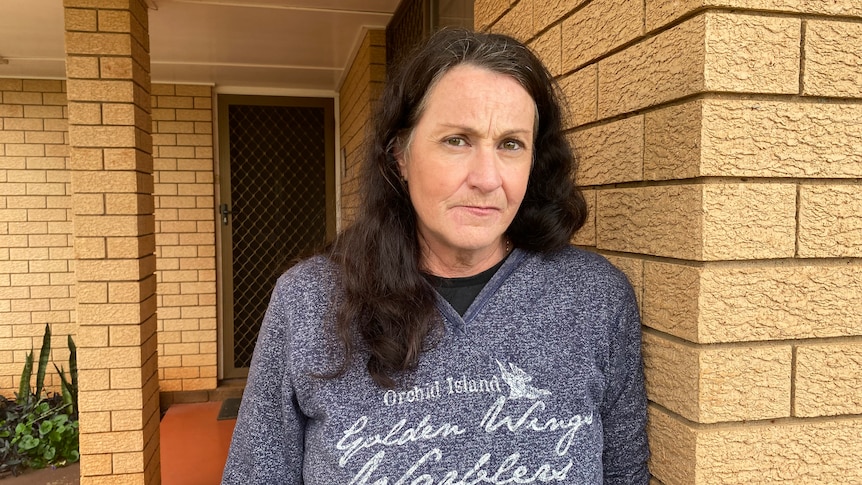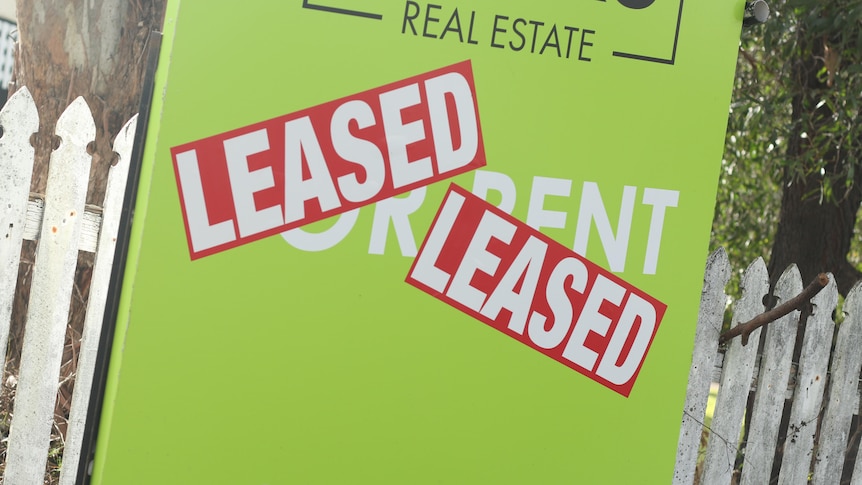Fifteen dollars might be spare change to some but, for those trying to contend with feeding a family and grappling with rising costs of living it is a rent rise few can afford.
Key points:
- Toowoomba has been identified as having the highest amount of rental stress in the country
- Families say they’re making major sacrifices to meet the rise in weekly rent payments
- Experts are calling for more social housing to address the issue
According to a new survey from Data Finance Analytics Toowoomba, southern Queensland has one of the highest rates of mortgage and rent stress in the country.
The survey of 47,000 people across Australia found 61 per cent of renters were under rental stress, while in Toowoomba 57 per cent of the 240 respondents experienced rental stress.
Lyndal Hood is one of them. She and her husband’s rent has recently risen by $15 a week.
“Our rent went up from $230 to $245 when we got our new lease,” she said.
Ms Hood’s husband works in retail, and she worked in hospitality until forced to take a break after a heart attack late last year.
major sacrifice
Ms Hood said while it may seem like a small amount, it quickly added up.
“That extra $30 to [fortnight]that’s the price of my medications,” she said.
“That means no extra money left over, and it’s not like we’re bludgers.
“If it went up further, we’d have to leave because we can barely cope with what we’ve got.”
Ms Hood said she had no choice but to stay in her property and pay the extra amount.
“I feel like we’re just stuck,” she said.
“We look around town at what else is out there and it’s no better than this place. The house across the road is $360 a week and it’s a dive.”
Darling Downs and South West REIQ president Daniel Burrett said rent rises were generally the landlord’s reaction to increasing interest rates.
“Rents are continuing to go up,” he said.
“The average rent price in Toowoomba is in the early $400s. It used to be around the $330 to $340 mark.”
statewide surge
Statewide it is no secret that rent is also surging, particularly in high-growth areas.
According to the Everybody’s Home campaign that coincides with Homelessness Week this week, the average rent on the Gold Coast rose by over 15 per cent in the past three years.
Everybody’s Home spokesperson Kate Colvin said the data proved how many people were at risk of homelessness.
“We know that rental stress is the gateway to homelessness,” she said.
“When you combine surging rents with flat wages you put people in a financial vice and for the past three years that vice has been tightening.”
Ms Colvin said it would not just affect low to middle-income earners and was “a handbrake on the economy right through regional Australia”.
“You have situations where in tourism locations restaurants can’t open every day of the week because they can’t get the staff, or aged care services around the country where they simply can’t get the staff to operate at full capacity,” she said.
“A part of the reason for that is because people won’t move to an area to take up work if they can’t find a house or a property in the rental market.
“In terms of our economic health, particularly in regional Australia, housing is an important part of the picture.”
never been worse
Data Finance Analytics principal Martin Short said he had never seen it as bad.
“Unfortunately, both rental stress and mortgage stress seem to rise and the pressure on households is really stressful and growing,” he said.
“I’ve never seen it so high with almost half of households with a rent obligation finding it really difficult to service it.
“It’s the worst in the high-growth corridors, the areas of the country that have been on a lot of new developments.”
Rents rose by 12.1 per cent on the Sunshine Coast to an average of $641 per week and 9.4 per cent or $426.21 per week in Cairns.
Ms Colvin said the solution was in social housing.
“Obviously, building social housing would deliver rental properties, but rental properties that are targeted to low-income households who are the ones who are being most squeezed out of the rental market,” she said.
Ms Colvin said this would then free up rentals for people in other income brackets.
“So, it’s a really great solution that really fits the problem,” she said.
.

